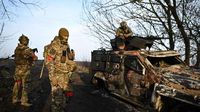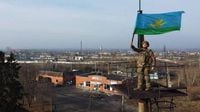The Ukrainian military faces immense challenges in the Kursk region as Russian forces continue to gain ground amid reports of a chaotic retreat by Ukrainian troops. This escalation has raised serious concerns about the future of Ukraine's military operations and its overall strategic position in the conflict with Russia.
Recently, Ukrainian soldiers described their retreat from Kursk as 'catastrophic,' citing heavy shelling, the destruction of military equipment, and incessant drone attacks by Russian forces. The chaotic scenes have been likened to those from a horror film, with some soldiers expressing that tactical errors may have contributed to the swift advance of Russian troops. In light of such challenges, General Oleksandr Syrsky, the commander of Ukraine's armed forces, has admitted that almost two-thirds of the territory Ukrainians previously controlled in Kursk has been lost, and he has called for reinforcements in the area.
President Volodymyr Zelensky echoed these sentiments during a press briefing, indirectly acknowledging the necessity of a tactical retreat. He stated, "The situation is very difficult. I can only thank our fighters for this operation, who have fulfilled their tasks." This concession reflects the gravity of the circumstances as Russian forces intensify their offensive to reclaim territories lost to Ukrainian control.
As of March 9, 2025, it was reported that the road connecting Sudscha to the Sumy region was under effective enemy control, with soldiers encountering two to three drones per minute along this critical supply route. The situation for the remaining Ukrainian forces in Kursk has therefore become increasingly perilous as they are under heavy pressure from the advancing Russian military.
In a bid to reorder the Ukrainian military command structure amidst accusations of inefficiency, President Zelensky appointed Andrii Hnatow as the new Chief of General Staff. Hnatow’s primary task will be to enhance the management efficiency of military operations, as noted by the Kyiv Independent, emphasizing the necessity of adapting the knowledge gained from ongoing conflict back into military planning.
Reports suggest that the recent appointment came out of frustration towards existing military leadership, primarily General Oleksandr Syrsky, who has faced criticism for a lack of strategic foresight in managing military resources. Some military analysts argue that the Ukrainian army's struggles arise partly from strategic miscalculations, within a command structure that has proven sluggish under pressure from Russian advances.
Ukraine’s military situation is compounded by the fact that independent estimates reveal a vast disparity in troop strength, with around 60,000 Russian soldiers reported in the Kursk region compared to only 10,000 Ukrainian troops. This imbalance is a cause of great concern as the conflict unfolds, and questions of logistic support remain critical.
Moreover, Ukrainian forces have started to employ counter-offensive tactics, including launching a drone strike in the Belgorod region following their retreat from Kursk. This strategy aims to maintain pressure on Russian forces while attempting to reclaim the initiative. However, Russian reports indicate that a significant number of these drones were intercepted during the night, leading to casualties, including civilians in the Kursk region who were injured during a drone attack on a truck.
The dynamics of the conflict have led to a series of urgent diplomatic engagements. Talks are set to take place in Saudi Arabia within the next few days as Ukrainian leadership seeks to stabilize relations with the United States, a critical ally. This engagement comes at a time when military and political leaders in Ukraine express concern over operational effectiveness impacted by a perceived lack of timely intelligence support from western allies.
Caught in a precarious situation, the Ukrainian leadership asserts that maintaining a foothold in Kursk is vital for future negotiations with Russia. Many believe the region could become a bargaining chip; however, the failure to sustain a robust military presence may significantly undermine Ukraine’s leverage at the negotiation table.
Independent military assessments highlight that the Ukrainian forces face a grim tactical landscape moving forward. The losses incurred in Kursk are viewed not just as territorial but as detrimental to Ukraine’s negotiating power in the long run. Should the current strategic missteps persist, Ukraine's ability to defend its interests and maintain its sovereignty will be increasingly jeopardized.
This harrowing situation underscores the bitter reality of warfare, where shifting dynamics can dramatically alter the strategies and outcomes anticipated by both sides. As the war continues to develop, the coming days and weeks will undoubtedly be pivotal in shaping not only the military landscape but also the geopolitical ramifications of this ongoing conflict.



